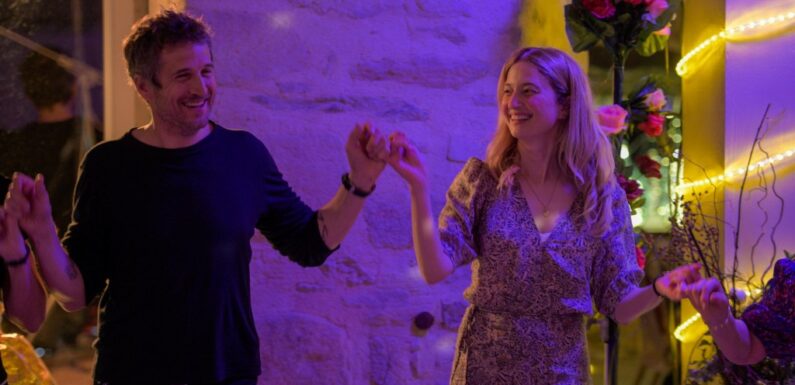
There’s a faintly between-worlds air to the coastal luxury spa in which the bulk of “Out of Season” is set: Spartan and depopulated, decorated in assorted shades of oyster white and palest aqua, it’s half sanatorium and half heaven’s gate, made uncannier still by the empty, forbidding sprawl of the wintering beach outside. That makes it an apt place for burnt-out actor Mathieu (Guillaume Canet) to come and consider where his life has led him thus far; it also proves a kind of corridor to the past, minus any actual time travel, when his visit reunites him with Alice (Alba Rohrwacher), a spurned lover from years before. In Stéphane Brizé’s lovely, sorrowful reflection on missed chances and regained connections, their reacquaintance isn’t necessarily permanent, and it doesn’t trigger the love story you might expect — but it’s deeply, searchingly romantic all the same.
Premiering at the tail-end of this year’s Venice competition — a subtle, semi-sweet palate cleaner to many of the brasher auteur statements preceding it — “Out of Season’s” gentle emotional tenor and wry humor make it a bracing departure from Brizé’s recent work, in particular his trilogy of politically seething workplace dramas “Measure of a Man,” “At War” and “Another World.” It’s consistent, however, with the director’s hushed humanism and deep, needling command of character, giving this notionally wispy story a lingering, substantial sadness. If it’s also a little over-extended, graced with one or two elegant endings too many, that shouldn’t deter arthouse distributors seeking upscale fare for mature audiences.
For its first half-hour, at least, the film appears to be yet another riff on “Lost in Translation,” as a disheveled middle-aged movie star checks solo into a cavernous five-star establishment, beset with what appears to be a near-terminal case of ennui. Mathieu is grayingly handsome, in good health, married to a glamorous news anchor, and still on the professional A-list — having recently begun rehearsals for his much-anticipated stage debut in Paris. But an all-round crisis of confidence has caused him to question his very place in the world: With mere weeks until opening night, he pulls out of the play, to the vocal consternation of its director, and heads to France’s sleepy west coast for a bout of expensive solitude and thalassotherapy, neither of which quite cures his ills.
Perfectly cast as a smooth operator confused to find himself coming undone, Canet brings a deadpan drollness to the film’s early scenes of Tati-esque physical comedy. Mathieu is repeatedly stumped by the spa’s start-of-the-art facilities, be it an elaborate massage machine or — in one priceless shot of everyday slapstick — an sensor-controlled coffee-maker that won’t stop pouring. He’s amusingly hapless company, but not especially sympathetic until he gets an out-of-the-blue text from Italian expat Alice, whom he hasn’t seen since their breakup 15 years ago. Turns out word of a celebrity visitor travels fast in this small seaside town, where, as coincidence would have it, Alice has long been settled with her husband and daughter.
They meet for a cordial catch-up, but once they’ve gone through the small talk and the exchange of family photos, it turns out they have bigger things to say to each other. Alice is still wounded by the abrupt way he broke things off; he’s still haunted by the sense he did the wrong thing. None of which is to say they should be together. Their respective marital problems are less to do with their spouses — stable and steady in Alice’s case, necessarily no-nonsense in Mathieu’s — and more to do with their own roving, restless sense of interior discontent. Alice, a stifled piano teacher who yearns for people to hear her own playing, is perhaps more reasonably unhappy than her wealthy, celebrated ex, but each somewhat understands the other’s deal, and feels somehow complicit in it.
Untangling this all will take a few bottles of wine and at least some renewal of their carnal knowledge, but mostly a whole lot of conversation — which Brizé and co-writer Marie Drucker write exquisitely, with as much truth in the characters’ pauses and dodges as in their most candid confessions. Canet and Rohrwacher play off each other beautifully, his suave, even louche charisma often upended and disarmed by her directness of gaze and expression.
But each time “Out of Season” seems to settle into a comfortable two-hander groove, Brizé surprises us with an unexpected set piece or break in perspective: a documentary-style interlude with an elderly acquaintance of Alice’s, testifying bluntly to the camera about the compromises and disappointments of later-life marriage, or an eccentric wedding performance by two avian impressionists. The film is quick to remind us that the world is wider and stranger than its characters’ fairly ordinary problems, though the characters are aware of that too: “Compared to global warming,” Mathieu admits, “it doesn’t really matter.” Yet it also kind of does: “Out of Season” caringly presents two people holding themselves back from the world, hindered by a shared knot in their past, looking again to leave other, but better this time.
Read More About:
Source: Read Full Article